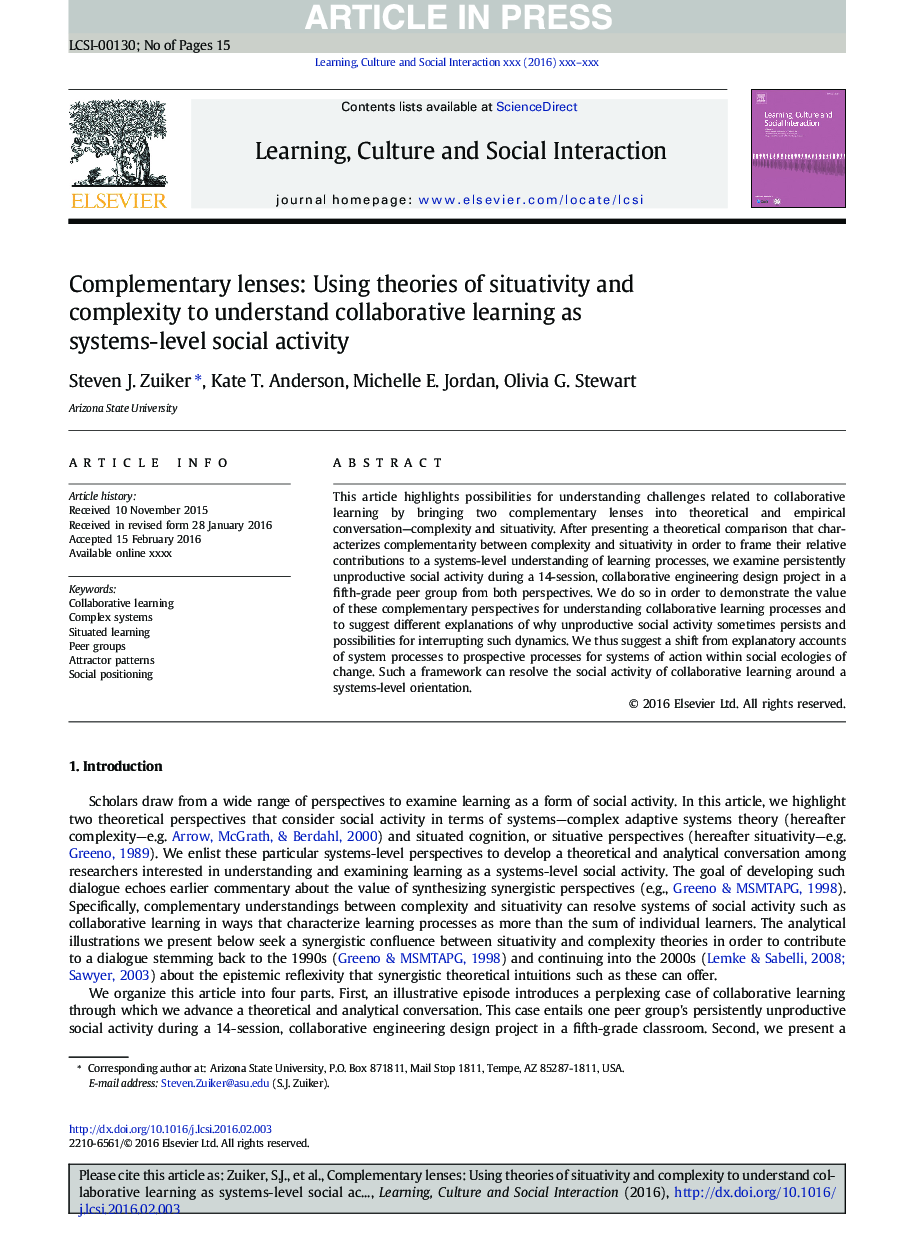| کد مقاله | کد نشریه | سال انتشار | مقاله انگلیسی | نسخه تمام متن |
|---|---|---|---|---|
| 6844221 | 621052 | 2016 | 15 صفحه PDF | دانلود رایگان |
عنوان انگلیسی مقاله ISI
Complementary lenses: Using theories of situativity and complexity to understand collaborative learning as systems-level social activity
ترجمه فارسی عنوان
لنزهای تکمیلی: استفاده از نظریه های موقعیتی و پیچیدگی برای درک یادگیری مشارکتی به عنوان فعالیت اجتماعی در سطح سیستم
دانلود مقاله + سفارش ترجمه
دانلود مقاله ISI انگلیسی
رایگان برای ایرانیان
کلمات کلیدی
یادگیری مشارکتی، سیستم های پیچیده، یادگیری موقعیت گروه های همکار الگوهای جذب، موقعیت اجتماعی
ترجمه چکیده
این مقاله، فرصت های درک چالش های مربوط به یادگیری مشارکتی را بوسیله آوردن دو لنز مکمل در گفتگوهای تئوری و تجربی، پیچیدگی و موقعیت پذیری نشان می دهد. پس از ارائه یک مقایسه نظری که مشتمل بر مکمل بین پیچیدگی و موقعیت شناختی است تا سهم نسبی آنها را در درک فرایندهای یادگیری در سطح سیستم در نظر بگیریم، در طول 14 جلسه، پروژه طراحی مهندسی همکاری در سطح پنجم گروه همسالان از هر دو دیدگاه. ما این کار را برای نشان دادن ارزش این دیدگاههای مکمل برای درک فرایندهای یادگیری مشارکتی پیشنهاد می کنیم و پیشنهادات مختلفی مبنی بر این که چرا فعالیت غیر فعال اجتماعی بعضی اوقات همچنان ادامه دارد و امکان وقفه در چنین دینامیکی وجود دارد. به این ترتیب ما پیشنهاد می کنیم تغییری را از حساب های توضیحی فرایندهای سیستم به فرایندهای آینده برای سیستم های عمل در محیط زیست اجتماعی تغییر بدهیم. چنین چارچوبی می تواند فعالیت اجتماعی یادگیری مشارکتی را در یک جهت گیری در سطح سیستم حل کند.
موضوعات مرتبط
علوم انسانی و اجتماعی
روانشناسی
روانشناسی رشد و آموزشی
چکیده انگلیسی
This article highlights possibilities for understanding challenges related to collaborative learning by bringing two complementary lenses into theoretical and empirical conversation-complexity and situativity. After presenting a theoretical comparison that characterizes complementarity between complexity and situativity in order to frame their relative contributions to a systems-level understanding of learning processes, we examine persistently unproductive social activity during a 14-session, collaborative engineering design project in a fifth-grade peer group from both perspectives. We do so in order to demonstrate the value of these complementary perspectives for understanding collaborative learning processes and to suggest different explanations of why unproductive social activity sometimes persists and possibilities for interrupting such dynamics. We thus suggest a shift from explanatory accounts of system processes to prospective processes for systems of action within social ecologies of change. Such a framework can resolve the social activity of collaborative learning around a systems-level orientation.
ناشر
Database: Elsevier - ScienceDirect (ساینس دایرکت)
Journal: Learning, Culture and Social Interaction - Volume 9, June 2016, Pages 80-94
Journal: Learning, Culture and Social Interaction - Volume 9, June 2016, Pages 80-94
نویسندگان
Steven J. Zuiker, Kate T. Anderson, Michelle E. Jordan, Olivia G. Stewart,
